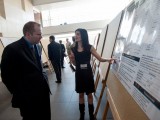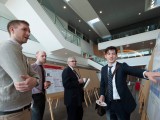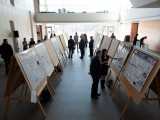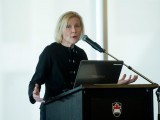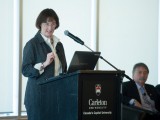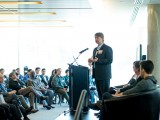By Kristy Strauss
David Lau believes that big data is the next industrial revolution and that Carleton University is the perfect hub, especially with a proposed new collaborative master’s program in data science in the works.
“(Big data) is an emerging field,” says Lau, a structural engineering professor. “We can call it the next industrial revolution because the impact is that significant.”
On Thursday, April 24, Carleton hosted Data Day to demonstrate the breadth of activity presently on campus, including a student poster competition. A high level panel set the tone for the day by identifying the needs and challenges for the rapidly emerging big data/analytics sector.
Carleton proposes to mount a new collaborative master’s program in Data Science, designed to prepare students for growing job opportunities in the next frontier of the IT sectors. As part of the program, students will earn their degree in one of six academic disciplines with a concentration in data science through specialized courses and a thesis addressing a data science challenge. In parallel, the Sprott School of Business will introduce an MBA concentration in business analytics.
Few universities offer broad programming in this area. Carleton’s program would be geared to high-tech professionals and grad students who are interested in how to analyze and use big data collected by governments, industry, non-profits and others to do everything from improving the efficiency of health care delivery to profiling and predicting national security threats. Jobs opportunities are growing in the field.
Big data research has been active at Carleton for many years and Lau is one of more than 130 Carleton professors who are involved in one way or another.
It is more relevant than ever, says Lau, especially in today’s digital age.
“Now with the Internet and speed of the Internet, it allows for fast and easy access to information,” Lau says.
“Big data allows us to gather information, see the trends and see the big picture. This different branch of science and engineering allows us to look at things in a totally new way.”
Since 1997, Lau has been collecting and analyzing data from the Confederation Bridge and using that information to make recommendations of how to better manage bridges.
Jie Liu, an assistant professor in Carleton’s Department of Mechanical and Aerospace Engineering, has also been working on data science projects – one involves airplane engines and using data to determine when maintenance is needed.
“We are going to develop techniques to estimate the condition of the engine to tell the user if they need maintenance, if they do not need maintenance, or if they can prolong maintenance,” Liu says.
Shikharesh Majumdar, a professor in the Department of Systems and Computer Engineering and director of the Real Time and Distributed Systems Research Centre, specializes in information and communications technology and is researching platforms and techniques for processing big data and finding ways to analyze it more efficiently.
One aspect of his research is finding ways to analyze data in real time.
“You might have to do things very quickly, so in some kind of event with a monitored smart facility that needs immediate attention, you can have a response in minutes,” he says.
Other research projects include DNA and molecular modelling data in the Department of Biology and School of Computer Science, natural language processing and artificial intelligence.
Carleton is also home to the Centre for Qualitative Analysis and Decision Support, where businesses and organizations in the community can access the expertise of the university’s mathematicians and statisticians.
John ApSimon, director of Corporate Relations at Carleton, is currently fundraising for a Big Data Institute that would be housed in the Faculty of Science but would operate on a pan-university basis.
“The idea here for our institute is to develop it from the get-go as a multidisciplinary initiative covering aspects of Big Data and Analytics in all Faculties and the Library,” ApSimon says.
Carleton is perfectly positioned to push the frontier of big data and offer a new Data Science Institute.
“IBM has been a key partner in the development of this concept,” says ApSimon. “We look forward to strengthening this relationship as we move forward in this growing and globally critical domain.”
Lau says that Carleton’s biggest strength as a university is its multidisciplinary approach to research and he looks forward to working with other faculties.
“Carleton is a very comprehensive university and that can have a significant impact on complex problems,” he says.
During Data Day, Carleton celebrated its strategic development in data science and held a discussion between national experts, academic leaders and community members about the possibilities and potential of the area.
For more information:
Chris Cline
Media Relations
Carleton University
613-520-2600, ext. 1391
christopher_cline@carleton.ca
